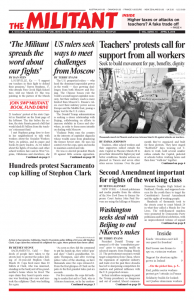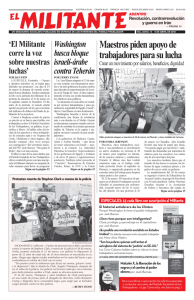BÉCANCOUR, Quebec — “We will fight for our rights. Through the struggle we have the opportunity to meet other workers and solidify the fight,” Danny Pilotte, a foundry worker, one of over 1,000 locked-out ABI Bécancour aluminum workers, told Communist League members on the picket line here March 4. The plant is the second largest aluminum smelter in the country, a major export industry here.
The workers, members of United Steelworkers Local 9700, have been locked out since Jan. 11. Alcoa and Rio Tinto bosses, the joint owners of the plant, are demanding concessions in pension coverage, seniority and other conditions. The company seeks to sharpen divisions between younger and more experienced workers by disregarding seniority in making job assignments.
Government officials in Quebec have been pressing the bosses and workers to reach an agreement and restore full production. But the company announced March 8 they have taken their final contract offer — voted down overwhelmingly by the workers on the eve of the lockout — off the table.
“The plant needs fundamental changes to succeed long-term,” plant director Nicole Coutu claimed. Coutu accused the union of using pressure tactics during the negotiations, causing “major deterioration of operational conditions” in the plant. She called on union officials to work with the company to increase productivity and competitiveness.
Company owners felt extra pressure from Washington’s threats of punitive tariffs against aluminum imports from Canada. The Donald Trump administration then exempted Canadian exporters from the tariffs for now. Some 80 percent of Canada’s aluminum production is exported to the U.S.
ABI bosses got a compliant judge to limit the number of pickets to 15 at a time and to restrict the ability of the workers to talk to truck drivers and others going into the plant.
The union has reached out to other workers and is winning broad solidarity. The Confederation of National Trade Unions (CSN) in Baie-Comeau recently donated $30,000. Others making contributions include Unifor, the largest private sector union in Canada; the Central of Democratic Unions (CSD); and other USW locals. The 400 Micro Bird bus factory workers in Drummondville are donating $1,000 a week.
“ABI management personnel are running one of three production lines,” Local 9700 President Clément Masse told the Militant. “The stoppage of two production lines costs ABI around $100 million.”
Many workers think the lockout is also aimed at pressuring Quebec for lower electric rates for the company. The smelter owners already have an advantage over their U.S. competitors because of relatively cheaper electricity prices from abundant hydropower here. ABI bosses want to do even better.
“The question of electricity rates probably justifies this lockout for them,” Masse said.
The lockout is having an impact on Quebec. The primary aluminum industry in Canada employs 10,000 workers. In 2017, Canada’s 10 smelters — nine in Quebec and one in British Columbia — produced 3.2 million tons of aluminum. Since January, the Bécancour lockout has reduced Canada-wide aluminum monthly output by 10 percent.
This is the second shutdown at ABI since the plant opened in 1986. A several monthslong strike in 2004 centered on defense of seniority, job classifications, control of the pension plan and opposition to contracting out work.
‘‘Bosses try to lower conditions of all workers,” said Steve Montambault, a laboratory technician at the plant. “In 2004 we said no to contracting out. The more experienced workers backed us when we all went out then. We will do the same in this lockout. We want to defend the younger workers so they will get the same conditions we’ve won.”

